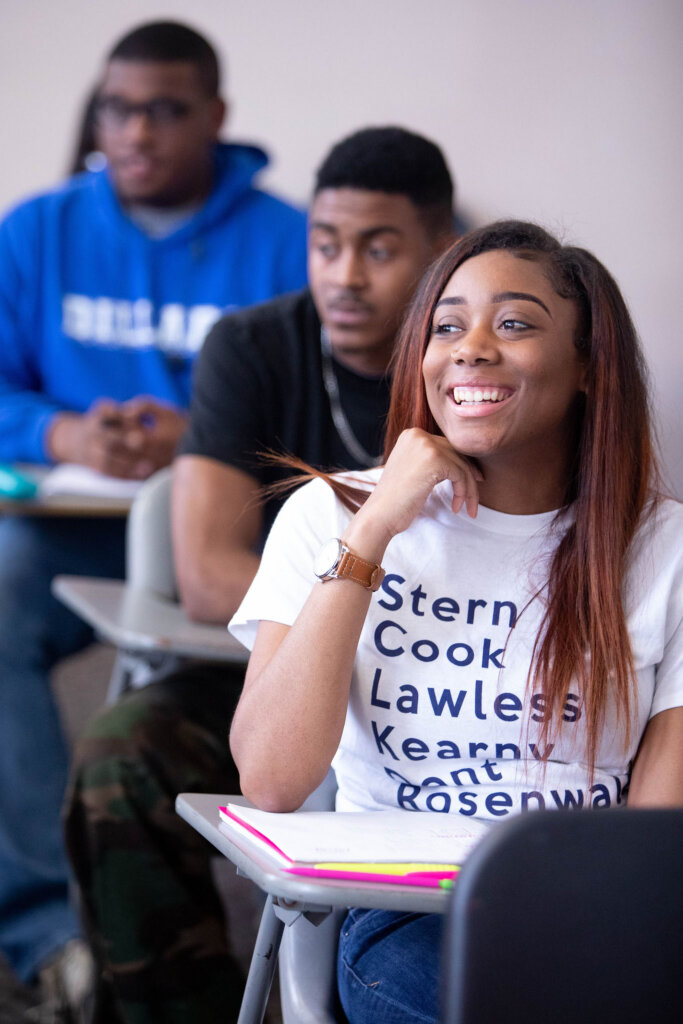Transformation
2030
Dillard University Strategic Plan
Dillard’s Communiversity Advancing Health, Safety and Innovation
INTRODUCTION
One of the Hallmarks of a strong institution is to continue to strive for excellence, remaining true to its founding while evolving and improving to meet the demands of the current environment and to prepare for the future. Each president of Dillard University, since it was formed from Straight and New Orleans Universities, have run a leg of this marathon of leading Louisiana’s oldest historically Black university. This marathon of leadership begins with the staff and faculty who invest their energy, creativity, innovation and compassion to uplift this community within the gates of the university and outside of it, locally, nationally and globally.
This strategic plan outlines the goals set forth by the board of trustees, the pillars established under the presidency of Dr. Walter Kimborough, and the strategies developed in 2022 and 2023 by former president Rochelle L. Ford, Ph.D., APR, with tremendous input from the staff, faculty, students, alumni, trustees and the surrounding community.
Dillard’s strategic plan outlines long-term goals, with annual priorities of the university, key performance indicators and milestones we need to achieve. This plan is designed to be a living document. Everyone at every level of Dillard University will offer support in implementing it and achieving its goals and objectives. At Dillard, everyone is a leader and everyone will continue to improve and grow.
Our mission, as refined by the board of trustees in 2021 is clear, and we feel empowered by the legacy of leadership, tenacity and resiliency of our ancestors as expressed in our motto of Ex Fide Fortis (From faith, strength).
Even as we publish this strategic plan, Dillard has already made forward momentum in implementing it. Many partners including UNCF’s Institute for Capacity Building Transformation Project, has enabled Dillard to jumpstart its efforts to achieve its strategic goals.
Our Dillard University community asks that you join us as we Transform Dillard into a stronger Communiversity that advances health, safety and innovation.
With Faith and Strength,
The Dillard University Community
Transformation 2030
Dillard’s Communiversity Advancing Health, Safety and Innovation
STRATEGIC PLAN 2020-2030
Mission
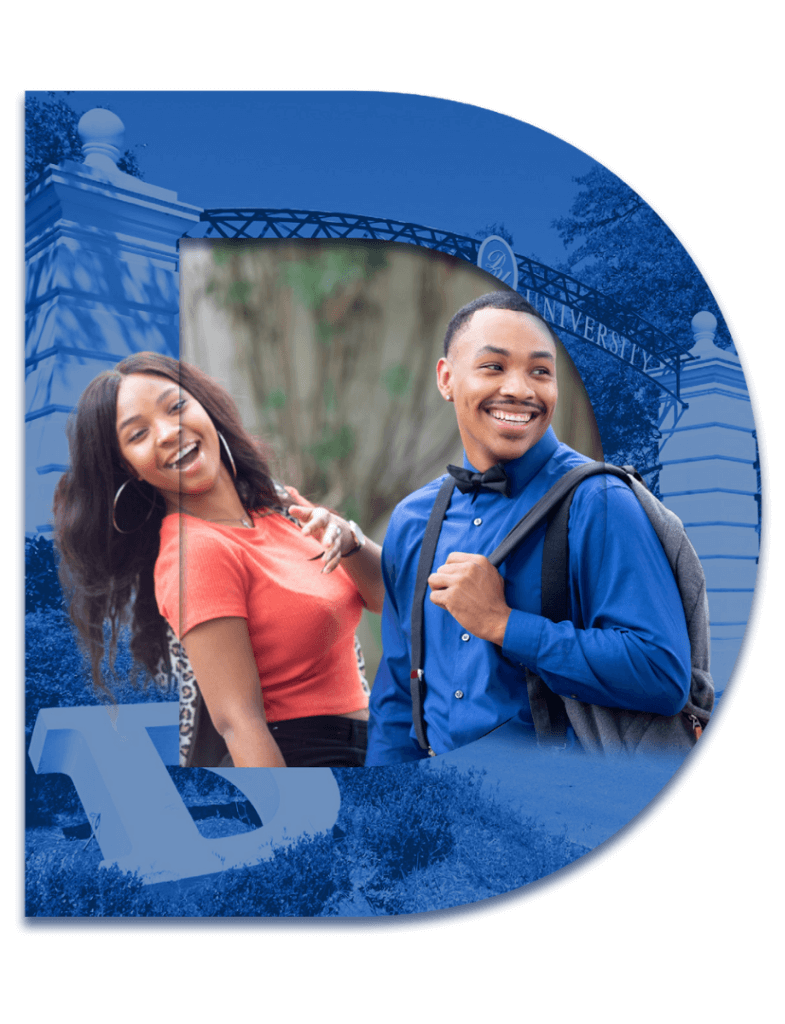
Dillard University is a historically Black institution that cultivates leaders who live ethically, think and communicate precisely and act courageously to make the world a better place.
Mission Explanation
Dillard University attracts the leaders, thinkers, and artists of tomorrow, and equips them with the tools they need to imagine and build a better world for everyone. Our students do not acquire knowledge alone; they develop compassion and high ethical standards alongside it. They are taught to think critically, but they do not stop at thinking; they act to turn their dreams into reality. In doing the work they are called to do, they do not choose the easy path over the right path. Instead, their commitment to excellence and integrity makes their work resilient by inspiring others to join their cause.
Motto
Our motto, “Ex Fide, Fortis,” can be interpreted as both “From Faith, Strength” and “From Confidence, Courage.” It is this faith that keeps our vision clear, our hearts full, and our actions confident and deliberate, as together we transform the world into the world that it should be.
University Background
Dillard University is a private four-year liberal arts faith-based university, affiliated with the United Methodist Church and the United Church of Christ. Located in New Orleans, Dillard is Louisiana’s first HBCU, born from the union of Straight College and New Orleans University, which were founded in 1869. We offer 22 bachelor’s degrees and two certificates in the disciplines of Business, Health and Wellness, the Humanities, Nursing, STEM and Social Sciences. Our diverse student body is composed of about 1200 students from 33 states and 12 countries. As of 2023, we offer 22 undergraduate majors, two certificates and a master’s degree in nursing focusing on nursing education and nursing entrepreneurship. Dillard has an average class size of 18, and a student-to- faculty ratio of 14:1. Dillard is accredited by Southern Association of Colleges and Schools Commission on Colleges (SACSCOC), Accreditation Commission for Education in Nursing (ACEN), and Accreditation Council for Business Schools and Programs (ACBSP).
Strategic Vision
Dillard strives to be a “communiversity” dedicated to cultivating leaders who advance health, safety and innovation. Dillard strives to ensure its students engage in high impact practices, grounded in the liberal arts yet providing them with transferable skills and knowledge that will prepare them for leadership in various life roles. Dillard aims to establish facilities that withstand the forecast on campus and in the community that will:
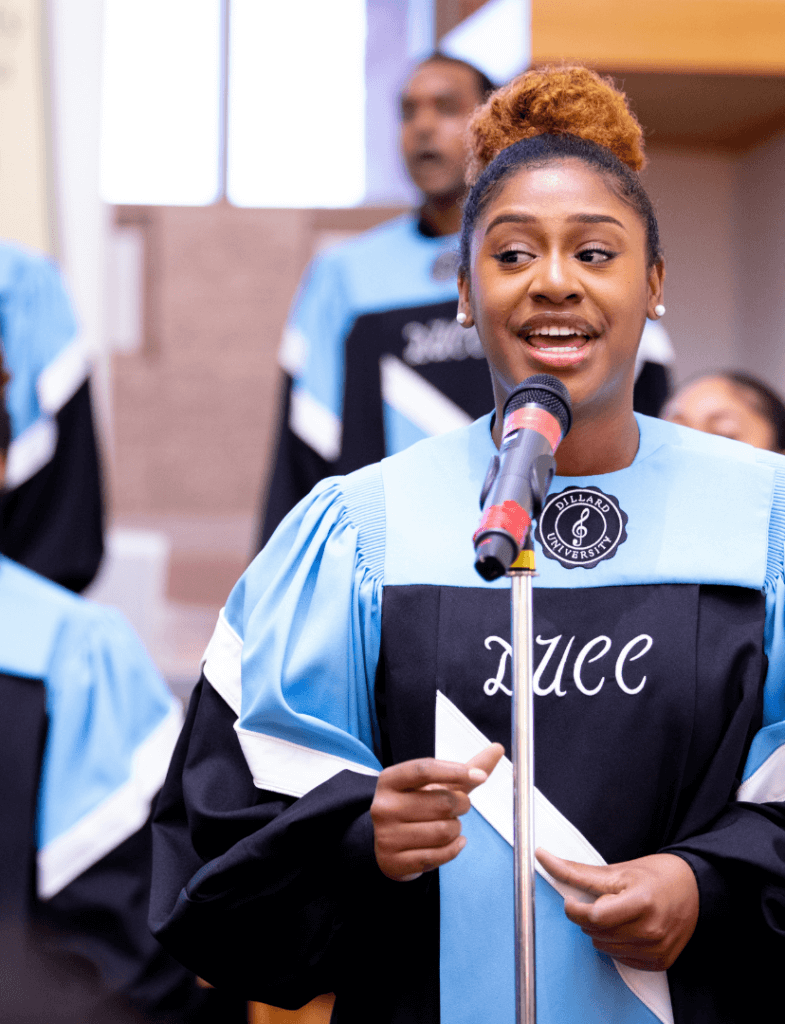
House living, learning, leading, serving communities (LLLSC) where students, staff and faculty can live together in themed buildings/floors dedicated to health, safety and innovation.
Cultivate business, governmental and non-governmental organization partnerships to advance these programs.
Offer community programs that advance health, safety and innovation.
Teach new or enhanced curriculum to students and community members locally and virtually, as professional development, certificates, bachelor degrees or graduate degrees.
Conduct action, applied, and basic research, and produce creative content to ensure innovation and understanding of the world and make it better.
Strategic Foci
Since July 1, 2022, Dillard University has been focusing its attention on the DU3:
- Facilities that withstand the forecast,
- Fortifying our staff and faculty, and
- Financing the future.
Members of the Dillard University community have made contributions and pledges of their time, talent, and treasure to ensure that Dillard is successful in our vow to activate our commitment to excellence. Dillard has many areas of expertise and has demonstrated our ability to collaborate. Therefore, our communiversity is confident in our capability to continue to cultivate leaders in the following three key areas to create healthy, safe, and innovative communities.

Mental and Physical Health has been at the core of Dillard University since its founding as Straight and New Orleans Universities, as it has been dedicated to the health and wellness of all people, particularly Blacks and other people of color, since the beginning. Here are recent hallmarks of why Dillard is uniquely positioned to advance mental and physical health.
As a university with the oldest nursing program in the state, and an NIH endowed Center for Minority Health and Health Equity Research, Dillard continues to activate its commitment to improve the mental and physical health of our communities.
Since 2022, Dillard has launched a master’s in nursing program in fall 2023, has earned a Gold Certification through the CEO Roundtable on Cancer, and is conducting equity-focused research in the communities we serve.
Our undergraduate programs with a health focus, including biology, psychology and nursing, remain strong and consistently had the largest enrollments in the last five years.
Dillard’s pre-health profession majors, public health and social work programs continue to draw external funding support and strong partnerships that advance physical and mental health. The social science programs investigate the impact of policy, environment, social justice and other issues on health and wellness. Dillard’s humanities programs, including music, theater, mass communications, English, film and art, provide inspiration, hope and culture that uplifts emotional health and wellness.
Dillard’s student success programs offer mental, spiritual, emotional and physical health and wellness programs. Through federal and private funding, these programs continue to grow and develop.
During the height of the Covid-19 pandemic, Dillard maintained one of the lowest infection rates and served as a community partner in providing vaccinations. Dillard continues to serve the community through monthly health and wellness fairs and community engagements.
Through its Ray Charles Program for African American Material Culture, AARP Community Garden, campus food banks, partnership with our food provider, and its food studies minor, Dillard is making an impact by helping students and the community to fight food insecurity and food deserts.
Opportunities
Dillard aims to offer new graduate degrees specifically related to mental health, as well as additional certifications to help faith, civic, educational, business, athletic and other leaders to improve physical and mental health and wellness in the spheres in which they serve, while continuing to serve the community through joint programming, outreach and connecting communities to resources. The university aims to build more community gardens and serve as an economic development partner to bring healthier food options to the community, and to educate the public about the benefits of a healthy lifestyle. The university also aims to deepen how it researches, documents, disseminates, preserves, and celebrates African-American culture and food-ways in the South.
Dillard University believes safe communities begin with entrepreneurship and economic development coupled with a strong racial and social justice approach to the criminal justice system. A Dillard education has been correlated to enhanced social and economic mobility Likewise, our outreach and research programs advance economic development, entrepreneurship, and social and racial justice. Below are hallmarks of how Dillard is positioned to continue to make strides:
Dillard University graduates students with $1000 less debt than public schools in Louisiana.
Dillard incorporates financial literacy into its scholarship and financial aid programs.
Dillard University has a supplier diversity program that helps to ensure we intentionally use black-owned, other minority-owned, and women-owned businesses, small businesses and other businesses who are committed to diversity as partners and vendors. Dillard offers opportunities for student-run and other community entrepreneurs to showcase and sell their products and services through pop-up shops during homecoming.
Dillard University’s School of Business is one of its fastest growing academic units, and has created graduate program partnerships with the College of Nursing in nursing entrepreneurship and nursing administration.
Dillard University is a founding partner of GNO Inc.’s Ventures Program, and has historically incubated new businesses through our university office of community relations. Additionally, the university has collaborated with the local music industry, and the Louisiana Film and Entertainment Development Office to have students engage in productions.
Through its criminal justice, urban studies, social work, and other academic programs, Dillard is a proven leader when it comes to working to make its communities safer and more equitable. Recently, faculty have conducted economic impact studies for the State of Louisiana related to the annual Essence Festival of Culture.
The university’s pre-law program offers co-curricular support via its Legal Education Advancing Diversity (L.E.A.D.) program, which includes a 10-week LSAT Prep boot camp, a year-long mentorship program with attorneys and judges in the community, law school application assistance, and one-on-one academic advising. In 2023, 100% of the graduating class received admission to law school and most students received scholarships. The university’s nationally ranked mock trial program provides a competitive co-curricular program where students enhance their research, communication and critical thinking skills.
The university offers online, evening and weekend, and traditional criminal justice degree pathways. This major continues to grow and provides many paid experiential and short-term study away learning opportunities.
Through lectures, research, advocacy, training, civic engagement, and political participation, Dillard’s Center for Racial Justice strives to bring systemic change in areas of public safety, education, advocacy, and juvenile justice/delinquency. The program spotlights the effects systemic racism has on communities of color. This program promotes partnerships with law enforcement including police departments and the sheriff’s office.
Opportunities
As Dillard constructs new residence halls, they will be designed to serve as living, learning and serving communities that will offer space to incubate small businesses and support professional development. Through its many specialized programs, Dillard has made financial literacy a key component of its developing one-stop-shop for student and family financial and wealth management services. The shop is working to develop new programs, and strengthen current programs that support the families of our students, which is especially important because more than 70 percent of the student body are from families at or below the poverty level. Dillard aims to expand its criminal justice program to offer certificates to law enforcement related to social justice.
Sustainability and Innovation through science, technology, engineering and math are key to addressing many of the United Nations’ sustainability goals, but so are the social sciences and humanities. Building from a strong liberal arts foundation, Dillard partners with industry to prepare students, not just for their first position, but for leadership roles. Dillard’s dedication to community engagement and the next generation of college students creates a 360-approach to creating innovative communities. Here are some hallmarks of how Dillard is positioned to continue to make strides:
Dillard remains a leader in educating Black women in physics and preparing K-12 students in STEM through summer and academic programs. Annually more than 200 youth participate in our programs, which are funded through external grants and contributions.
Through the Leadership Alliance and McNair Scholars Program, Dillard maintains partnerships with leading research institutions for students to conduct undergraduate research. Many leading universities, including Georgia Tech and Louisiana State University, have joint degree programs for students to complete a science degree at Dillard and an engineering degree at their institution.
Dillard has developed a certificate in Nuclear Physics and Radiation for medical physics students through the US Department of Energy’s Insight Center, and offers a certification in Urban Water Management, the first of its kind in Louisiana.
The university has completed multi-millions of dollars in research studies funded by the Department of Defense, NSF and other significant funding agencies. The university holds multiple patents and operates the Lasers Ablation and Materials Science (LAMS) Center.
Additionally, it has partnerships whereby students complete paid research experiences year round through research universities, including those in Japan.
A member of the IBM-HBCU Quantum Computing consortium and the NSF Minority Serving – Cyberinfrastructure Consortium, Dillard’s computer science program continues to grow with partnerships with Cisco, Apple, Google, and Epic Games among others. Faculty have been able to research the economic impact of events and programs, applying geospatial analysis (GIS) tools, and effectively using big data to allow us to help communities understand the impacts of technology and innovation.
The university is part of the H2TheFuture program with GNO Inc., opening doors for new certifications and exploration into new energy sources.
Dillard remains committed to eco-friendly infrastructure, as demonstrated in the construction of two LEED-certified buildings after Hurricane Katrina devastated the campus in 2005 and the commencement of a design-build project for a new living, learning, and serving community facility.
The growing computer science program provides a deep knowledge of the core principles of computer science skills necessary to use computers to solve real-world problems and experiences in implementing solutions with modern computing tools.
The university offers workshops that teach senior citizens and others how to use their mobile devices and other technology.
Students in the fine arts, film and mass communications program apply their storytelling skills to tell complex, technical stories through digital film, and video.
Dillard aims to re-establish its teacher education program, aiming at both professional development for the New Orleans charter school system to help current teachers achieve national certifications, and graduating more secondary teachers with dual majors in education and a STEM discipline. Dillard also strives to partner with private organizations to support broadband for the community and digital communications advancement. Dillard plans to identify and collaborate with entities that will help us achieve our goal to make the campus more energy efficient, as well as develop workforce programs related to wind and solar energy. Through effective communication and outreach, we are helping communities to understand sustainability, technology, and innovations.
Strategic Goals & SMART Objectives to be Achieved by 2030
The numbered states are the goals and the alphabetical subheadings are the measurable objectives
- Increase graduation rates by 10% from baseline of 50% six-year graduation rate in 2020, based on Outside in data assessment from IPEDS and Georgetown CEW; From 36.2% of the cohort entered in 2019
- Increase retention rate of undergraduate students to 80% or better, from the baseline of the new student cohort fall 2020-fall 2021 of 73% based on Dillard Institutional Research data
- Increase career placement rate (job, graduate/professional school or military service) at 9 months after graduation to 90%, from the baseline in 2020 of 81.8% overall career outcomes as reported by students, as recorded by the office of career services. In 2020, 30% were employed in a position related to their degree, 49% received graduate school acceptance, and 2.8% were in military related obligations)
- Increase graduate salary average by $5,000, from a 2020 baseline of $42,778 from IPEDS and Georgetown CEW
- Increase number of veteran students enrolled, from a 2020 baseline of two
- Increase number of military families enrolled from a 2020 baseline of 45
- Establish a cohort of 50 community college students who transfer
- Establish a cohort of 10 dual enrolled students who transfer
- Increase the number of weekend and online from a baseline of 19 students only online only student in 2020
- Increase the number of international students from a 2020 baseline of five students
- Increase the number of male students from a 2020 baseline of 279
- Increase contributions to the general endowment by $10 million
- Create a cash reserves fund of $5 million from a baseline of $2.5 million in a restricted account in 2021
- Increase unrestricted, non-undergraduate tuition revenue (e.g. graduate tuition, auxiliary services, certificates, unrestricted gifts, etc.) by $3 million from a baseline of $22,896,835 non-tuition revenue reported in the 2020 audit
- Maintain regional accreditation by the Southern Association of Schools and College (SACSCOC)
- Maintain current discipline accreditations by the Accreditation Council of Business Schools and Programs [ACBSP] and the Accreditation Commission for Education in Nursing
- Obtain discipline-specific accreditation for eligible new graduate programs
- Demonstrate that 80% of seniors meet or exceed expectations of achievement on institutional learning outcomes and program-level learning outcomes using direct and indirect assessment measures
- Increase the median ranking of Dillard University in regional and national rankings annually (Dillard will establish a list from which to report)
- Establish an average positive sentiment from annual brand audit over the course of preceding seven years
- Become listed as a “Best Place to Work” locally, regionally, and nationally
Establish a positive trend in employer brand and workplace satisfaction among employees - Establish a positive trend in brand perception within strategic markets
- Establish a positive trend in satisfaction among students through campus climate surveys.
Strategic Pillars & General Action Items
STRATEGIC PILLAR 1: Telling Our Story
1.1a) design and implement a comprehensive, strategic marketing and communications strategy to include paid, earned, shared, owned and special event tactics
1.1b) improve website experience and engagement
1.1c) conduct regular brand audits using media analytics and other qualitative and quantitative measures to inform strategy and measure impact
1.2a) provide functional areas with communications strategist, overall multimedia support, leveraging student, staff and faculty talent
1.2b) create a funding structure to support marketing and communications
1.2c) create policies and procedures to support student, staff, faculty and alumni
1.3a) create local, national and international events and communication in target markets for prospective students
1.3b) promote Dillard University as a destination to host special events, explore history and culture, service
1.3c) produce and distribute content that can be used across platforms representing the breadth and depth of university
1.4a) establish industry and community advisory boards for academic programs, university centers and interdisciplinary programs
1.4b) provide accessible resources for alumni, staff, faculty, students to engage with prospective students, donors, partners, churches, media, employers and other potential partners
1.4c) provide professional development for employees and staff to enhance media literacy and engagement
STRATEGIC PILLAR 2: Strategic Academic and Enrollment Initiatives
2.1a) establish a teacher education program
2.1b) establish an entrepreneurship program
2.1c) establish hospitality, sports and entertainment management specializations
2.1d) create pathways for careers in finance, insurance, human resources and banking
2.2a) update general education requirements to be more flexible
2.2b) ensure experiential learning experiences are required for all majors such as internships, clinical rotations, practicum and undergraduate research
2.2c) create interdisciplinary and discipline specific recruitment strategies
2.3a) Design and implement a data-informed retention plan that includes faculty mentors and staff academic course planners
2.3b) Establish strategic international enrollment partnerships that includes recruitment and support services
2.3c) Strategically expand cost effective intercollegiate and intramural athletic teams
2.3d) Create an inclusive culture and comprehensive veteran and military family programs to recruit, enroll and graduate veteran, active duty service members and their families
2.3e) Establish innovative dual high school enrollment program and streamlined direct admit programs from community colleges
2.4a) establish a master’s in nursing degree with specializations in education, administration and entrepreneurship
2.4b) establish a master’s in mental health counseling
2.4c) create certificate programs including the business of sustainable energy, social justice, domestic violence support, substance abuse counseling
STRATEGIC PILLAR 3: Enhance the Student Experience
3.1a) Expand campus food pantry, fresh foods grown on campus, and urban gardens to fight food insecurity
3.1b) Increase access and breath of mental and emotional health resources by integrating recreation, public health partnerships, existing and new grant sources, and partnering across units on campus and in the community
3.1c) Improve the residential and commuter student experiences by creating improved spaces and support services 3.1d) Enhance opportunities of extra-curricular and intramural activities on and off campus
3.2a) Expand student professional development opportunities and training focused on soft skills, leadership, safety, financial literacy, emotional intelligence and networking
3.2b) Improve service learning and community service engagement
3.2c) Integrate career exploration and development into academic affairs and student success 3.2d) Identify apprenticeship and internship opportunities to support pipeline to employment
3.2e) Improve access to graduate (Post-Baccalaureate) degrees (M.A., Ph.D., etc)
3.3a) Re-establish the National Center for Black Jewish Relations
3.3b) Establish an interdisciplinary office to support short-term and full-semester study abroad and domestic exchange programs, with the goal of 50% of students engaged
3.3c) Create international visiting faculty and staff opportunities
3.4a) Establish the One-Stop for Student Financial and Wealth Management Shop
3.4b) Establish the Office of Family Engagement
3.4c) Make residential facilities as hubs for Dillard’s living, learning and serving communities that integrates students who reside off and on campus
STRATEGIC PILLAR 4: Improve the Physical and Technological Infrastructure
4.1a) Expand and renew residential facilities to increase the Gentilly area on-campus housing options and number of students, faculty and staff served. This will reduce reliance on non-Dillard owned or operated facilities
4.1b) Expand and renew athletics facilities for intercollegiate and intramural sports to reduce the travel time for practices and home-games
4.1c) Create a space utilization plan to accommodate renovations to buildings and new construction
4.1d) Increase net assets through property acquisition and public, private partnerships
4.1e) Establish a community development/asset management group
4.2a) Invest in Facilities and Campus Safety Staffing Solutions
4.2b) Create an enhanced system for reporting, communicating and tracking requests for maintenance, event set-up, cleaning, renovation and other facilities and information technology support (to include (policies, procedures, technology and meetings)
4.2c) Enhance campus security through campus lighting, keyless entry, security cameras and other technologies
4.3a) Review existing technology systems and reduce duplication of services
4.3b) Increase investment in Jenzabar with enhanced training for faculty and staff
4.3c) Create a data governance guide and data sharing dashboards to enhance communication and efficiency
4.3d) Create and implement a strategic information technology action plan
4.3e) Automate student payment processes internally and externally
4.4a) Create an Office of Sustainability
4.4b) Establish a recycling program
4.4c) Create a back-up energy / alternative power solution
4.5a) Establish the University Emergency Management Team
4.5b) Conduct on-going scenario trainings to enhance emergency procedures and test against changing climate challenges
4.5c) Implement routine facility and technology checks to reduce risks and make necessary upgrades or adjustments
STRATEGIC PILLAR 5: Strengthening the Fabric of Our Community and Culture
5.1a) Establish a Presidential Commission on Diversity, Equity, Inclusion & Justice to research and lead DEIJ efforts to enhance the culture of inclusion at Dillard for students, faculty, staff and community
5.1b) Implement required professional development to enhance responsiveness, efficiency, quality, customer service and university collaborations
5.1c) Create mental, emotional, physical and spiritual health campaigns and engagement activities
5.1d) Revise and implement an employee performanc evaluation system to help with continuous improvement, constructive job performance feedback, accountability and rewards
5.2a) Create and implement a strategic plan for the Office of Alumni Relations that incorporates cross-campus collaborations including athletics, sororities and fraternities, fine and performing arts, career offices, and academic affairs
5.2b) Establish an alumni mentoring program and mechanism to encourage alumni to volunteer time
5.2c) Increase the number of active Dillard University alumni association chapters by providing responsive and proactive support to current and prospective chapter leadership
5.2d) Improve the timing, frequency and responsiveness of university communication with alumni through multiple media strategies including print, online, email and social media to allow alumni ample time to plan for participation in university programs, donating and supporting students
5.3a) Establish an incentive fund to offer bonuses and awards for outstanding employee performance
5.5b) Increase access to health insurance, retirement plans and financial literacy
5.5c) Contract with third-party to improve grant writing and external funding outcomes
5.3d) Create a multi-year budget that builds revenue streams and makes strategic investments to enhance compensation, benefits, and campus facilities and programs for employees
5.4a) Establish public and private partnerships for identified operations across the university
5.4b) Increase revenue through rental of auxiliary services
5.4c) Establish an employer engagement portal
5.5a) Conduct a capital campaign assessment and build a robust development team
5.5b) Create additional donor recognition events and stewardship mechanisms leading into and during the capital campaign
5.5c) Strengthen annual giving to fund facilities, faculty and staff development, and finance students through scholarships and funding for experiential learning opportunities, such as study abroad, undergraduate research, internships and service
5.5d) Partner with UNCF, United Church of Christ, and United Methodist Church
